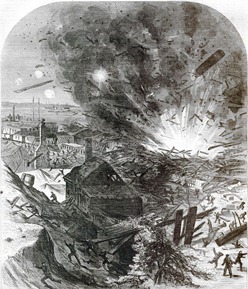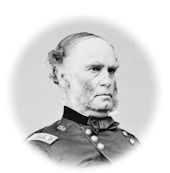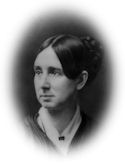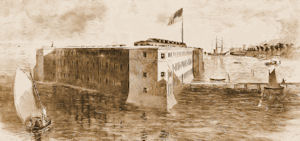HEADQUARTERS DEPARTMENT OF FLORIDA,
Fort Pickens, Pensacola, May 13, 1861.
Lieut. Col. E. D. TOWNSEND, Assistant Adjutant-General:
COLONEL: Since my last nothing of interest has occurred, and no demonstration of any kind been made by the enemy. He continues strengthening his batteries, but I cannot perceive that he has erected any new ones. The Florida and Alabama Railroad has been finished, and he has received some large guns and mortars ; but, so far as I can discover, he is rather making defensive than offensive preparations. My command has been unceasingly employed in unloading ships, storing provisions and stores, and in putting up works for the protection of the men and guns in the fort, and for bombarding the enemy without. The most important would ere this have been finished but for the want of sand bags, which is so important that I had to send an officer to Havana to purchase them or gunny-bags. Major Tower states that he made a requisition for 100,000, and sent it to Washington by Lieutenant Gilman in March, and no notice has yet been taken of it, although two steamers have since then arrived, by one of which (the Philadelphia) they might have been sent.
Having understood that there were three sea-coast 10-inch mortars at Tortugas, I have ordered two of them here. I am also in daily expectation of the schooner Perrin, which sailed from New York about the 17th of April. When she arrives we shall have, it is hoped, every article necessary for offensive operations, of many of the most essential of which we are now sadly deficient.
Great abuse of the flag of truce having in two or three instances occurred, I wrote General Bragg the letter marked A, and sent it by Captain Hartsuff, assistant adjutant-general. In the afternoon of the same day his aid, Captain Wood, accompanied by Captain Stevens, of the Engineers, came to the wharf, where I met them. He brought me a letter from General Bragg, addressed to me commanding Fort Pickens. I told Captain Wood that I was by order of my Government in command of the Department of Florida; as such I had addressed General Bragg, and that I could receive no official communication that did not recognize me as such. He carried back the letter, and I have since heard nothing on the subject. But no objectionable movements have since taken place. On the 7th two steamers appeared off the bar. They were brought to by the Powhatan and Brooklyn, and afterwards permitted by Captain Adams to return to Mobile. I inclose letters B, C, and D on this subject.
My sick-list is increasing, attributable, I think, to hard labor in a hot sun. None of the cases are very serious. I have lost two by death and two by desertion. I earnestly renew my application for a fast-sailing steamer or steam-tug of light draught of water. Two would be better than one. Their necessity can hardly be overestimated.
Since my last the mortar battery north of the fort has been finished and the mortars put in it, and I shall in a day or two have one for four 8-inch howitzers completed near the same place. I propose also commencing this week near the sea-beach, and to the east of these batteries and about six hundred yards from them, a battery for three 10-inch columbiads, and afterwards another for the same number of columbiads in a place yet to be selected. These finished, the guns and shells received, I hope to be able to give a good account of my command.
Company G, First Artillery (the old company), is so tainted with scurvy as to be of little or no service to me, and the disease increasing daily, I have on the certificate and recommendation of the senior assistant surgeon ordered them to Fort Hamilton (vide letter E). I have been induced to this by the long and distinguished services of this company at this place, by the report of the surgeon that a Northern climate was necessary to the recovery of their health, by the conviction that they would be of but little service to me, and by the fact that they can be sent to the North without any expense to the Government. I trust that my action will meet the approval of the General-in-Chief. I have attached the newly-joined men to Company A, First Artillery. I have directed Major French to send me by the first opportunity one of the companies now at Key West. I am amply strong to hold this fort against any force the enemy can bring against it, but not to prevent a lodgment on the island by a large force, which they can in one night throw on it, and I have therefore reluctantly ordered a company from Key West, where I think they are not strong enough; but this place is of the most pressing importance at present.
I have not received any orders or official communications, but see by the papers that affairs have materially changed since I received my instructions to act only on the defensive. Is it the intention of the Government that the same orders should govern me, or may I, if occasion offer, take the offensive?
I am, colonel, very respectfully, your obedient servant,
HARVEY BROWN,
Major, Second Artillery, Colonel Commanding.

[Inclosure A.]
HEADQUARTERS DEPARTMENT OF FLORIDA,
Fort Pickens, May 6, 1861.
Brig. Gen. BRAXTON BRAGG, Commanding Troops in Florida:
SIR: I respectfully call your attention to what I conceive an abuse of the rights and privileges of a flag of truce. This morning a steamer came to the wharf of this post with a flag, in which, besides the bearer, were a number of officers of your command and some citizens with spyglasses, the professed object of the flag being to bring a private letter from a lady to a subaltern officer of my command.
A steamer a few days since, also with officers of your command on board, visited one of the ships off this post, and in going and returning, instead of keeping in a direct line, coasted along the shore on both sides as close to this fort as she with safety could.
These both are, in my judgment, gross abuses of the flag, and I trust you will cause them to be immediately corrected. I observe and cause to be observed by my command strictly the laws of war in such cases, and expect a like observance on your part.
I am, sir, very respectfully, your obedient servant,
HARVEY BROWN,
Colonel, Commanding.

[Inclosure B.]
HEADQUARTERS DEPARTMENT OF FLORIDA,
Fort Pickens, May 8, 1861.
Capt. H. A. ADAMS, Commanding Naval Forces off Pensacola:
CAPTAIN: I deem it my duty to call your attention to the importance to the defense of this fort of excluding all steamers from the harbor. Their introduction would be of essential injury to us and benefit to the enemy, so that every possible precaution should, I think, be used to prevent it. I think that under no circumstances should a steamer or a vessel loaded with forage or provisions or articles contraband of war be permitted to enter. All those articles are for the consumption of the army of the enemy, and we, by permitting their introduction, are really feeding our enemies, and giving them the means of assailing us. We have information, which though not official, is authentic, that our steamers have been seized and appropriated by the enemy; that he has issued letters of marque, and is fitting out privateers, and that our officers have been taken prisoners, our property stolen, and that one of your own officers is now a prisoner in his hands. Under these circumstances, should not effective measures be taken to stop all vessels? I certainly think so. Permit me to suggest that the passage at the north of the island and the landing of the Perdido should be strictly watched, and that every possible exertion should be used to prevent the introduction of supplies of any and every kind.
I am, sir, very respectfully, your obedient servant,
HARVEY BROWN,
Colonel, Commanding.

[Inclosure C.]
U. S. FRIGATE SABINE,
Off Pensacola, May 8, 1861.
Col. HARVEY BROWN, U. S. Army, Fort Pickens:
COLONEL: I have given orders to the guard-vessels to allow no provisions to enter Pensacola Harbor. In the absence of all instructions with regard to the blockade, I do not know how to proceed towards foreign ships, which by the laws and customs of nations are usually allowed a certain time to come and go after the declaration of a blockade, nor towards those coasting vessels which exhibit a license from the U. S. Government. My doubts on this subject prevented me from making prizes of the two steamers detained last night, which had cargoes of provisions consigned to Judah & Le Baron. I have sent them back to Mobile. The President’s proclamation of blockade is dated April 19, and it is more than time some specific directions about it should have reached me here. Should I hear of any privateers, man-of-war, or letter of marque being at sea, under the secession flag, I intend to commence making captures immediately. But I shall be greatly embarrassed what to do with them, as I have no officers to put on board and carry them to a port of the United States for adjudication. Has any progress been made in the preparation of a battery to receive the Brooklyn’s 9-inch guns, if it should be thought advisable to land them? I am afraid the work of discharging the Philadelphia will go on but slowly, as the large boats of the Powhatan have been so much injured as to require extensive repairs, and those of the Brooklyn will be employed for a few days in ballasting the Supply.
Very respectfully, your obedient servant,
H. A. ADAMS,
Captain, Senior Officer Present.

[Inclosure D.]
HEADQUARTERS DEPARTMENT OF FLORIDA,
Fort Pickens, May 8, 1861.
Capt. H. A. ADAMS, Commanding Naval Forces off Pensacola.:
CAPTAIN: I wrote you this morning on the subject of allowing provisions to enter Pensacola Harbor, and am gratified that you have so far anticipated my wishes. I am not prepared to express a decided opinion as to the foreign vessels, but as the port has not been actually declared in a state of blockade I should suppose it to be expedient to let them pass unless they actually have on board articles contraband of war. I am, however, decidedly of opinion that no United States vessel, containing any article which will nourish or assist the enemy, should be permitted to enter, and most certainly no one, either American or secession, from a rebel State. I regret that you did not feel it to be your duty to detain the two steamers, they being in my opinion lawful prizes.
I have done nothing in relation to the batteries for the guns of the Brooklyn because I distinctly understood you to say that you could not possibly spare any guns from her. I may also say that other and more pressing work would have prevented my doing it, but that I will have an engineer detailed to lay out and superintend such a work whenever you may wish to commence it, presuming, as I do, that your officers will wish the whole to be a Navy work.
Is not the unloading of the Philadelphia and provisioning and supplying this work of very paramount importance to ballasting the Supply? I think that now, while the sea is smooth and the enemy quiet, nothing should take the boats off, and I most respectfully urge that the ballasting the Supply may be deferred until after the steamer is unloaded.
I am much obliged for the papers.
I am, captain, very respectfully, your obedient servant,
HARVEY BROWN,
Colonel, Commanding.

[ Inclosure E. ]
FORT PICKENS, FLA., May 9, 1861.
Capt. GEORGE L. HARTSUFF, Assistant Adjutant-General:
SIR: I have the honor of addressing you for the purpose of calling the attention of the colonel in command of the department to the condition of the men of Company G, First Artillery, stationed at this post. Said company has been for the last three years stationed in this vicinity, and for the last four months confined to the limits of this post. During the latter period it has been almost altogether deprived of fruits and vegetables, and during the whole of the three years but very scantily supplied therewith. Whilst occupying this fort the men and officers of the company have been taxed to their utmost capacity by physical labor and incessant watching night and day against attacks from the enemy. A number of cases of scurvy have already appeared among the men, some of them of considerable severity, and there is great reason to fear the general prevalence of the disease among them. The approach of the hot season will tend to aggravate the disease. The supplies of anti-scorbutics in the commissary stores I trust will be sufficient to prevent the appearance of the disease among the men lately arrived from the North, but I do not believe in their efficacy to relieve the cases which have already appeared or to prevent the recurrence of new cases among the men of Company G, First Artillery. Were it in your power to do so, I would suggest the advisability of ordering to the North the old soldiers of the company; but if it be not in the limits of your authority to do so, I respectfully recommend that that portion of the company which has been on duty here so long be ordered to Key West, in order that the men may avail themselves of the tropical fruits and vegetables to be procured at that place, and for the benefit otherwise to be derived from change of air.
I have the honor to be, sir, very respectfully, your obedient servant,
JOHN CAMPBELL,
Assistant Surgeon.








